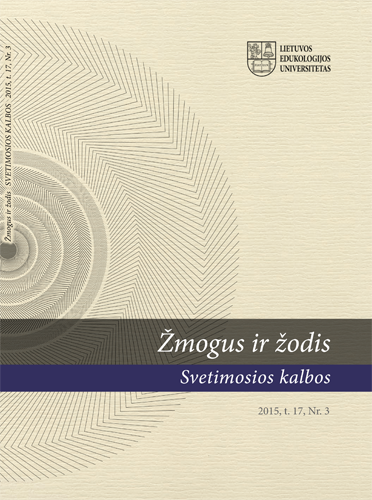Praesens Historicum или Dramatic
Present? К вопросу о терминологическом
обозначении и прагматике презенсных форм в переводном нарративе
Praesens Historicum or Dramatic Present? Terminology and Pragmatics of Present Forms in a Translated Narrative
Author(s): Anastasia UrzhaSubject(s): Russian Literature, Philology, Translation Studies
Published by: Vytauto Didžiojo Universitetas
Keywords: praesens historicum; dramatic present; function; pragmatics; translation; comparative analysis
Summary/Abstract: The article concerns pragmatic effects of the use of praesens historicum in Russian literary translation. The investigation starts with the comparison of rival terms used in the modern scientific discourse, such as “dramatic present” and “you-are-here-illusion”. These nominations draw our attention to the potential of the present form to create a kind of a cinematic ‘closeup’ in a narrative. The comparison of the so-called ‘grammar-based’ and ‘text-based’ scientific interpretations of praesens historicum leads us to the idea that the influence on the reader, grasping the reader’s attention may be viewed as the key pragmatic function of such form in a narrative. Thus, for the following study, traditional focus on the elements that contrast with this transpositional verb form should be moved onto the linguistic means that interact with historical present as a whole functional complex in the text. The comparable material of various Russian translations interpreting the same English original provides us convincing data for such analysis. Several groups of texts, according to genre and target audience, are involved in the study, among them – the adventure literature for children, humorous novels for grown-ups, highly emotional and psychological prose. The article presents thorough analysis of the texts from the first group, studying Russian translations of ‘The Adventures of Tom Sawyer’ made by K. Chukovskij and N. Daruzes, and ‘Mary Poppins’ interpreted by B. Zakhoder and M. Litvinova. Semantic and grammatical surrounding of praesens historicum forms regularly chosen by some translators is compared to the context of narrative past forms used in other interpretations. Such means as deictic indicators, lexemes with perceptive meaning, emotive and evaluative words increasing subjectivization help to realize the overall dramatizing and foregrounding effect that is inherent to the praesens historicum form in a narration.
Journal: Žmogus ir žodis
- Issue Year: 17/2015
- Issue No: 3
- Page Range: 77-93
- Page Count: 17
- Language: Russian

